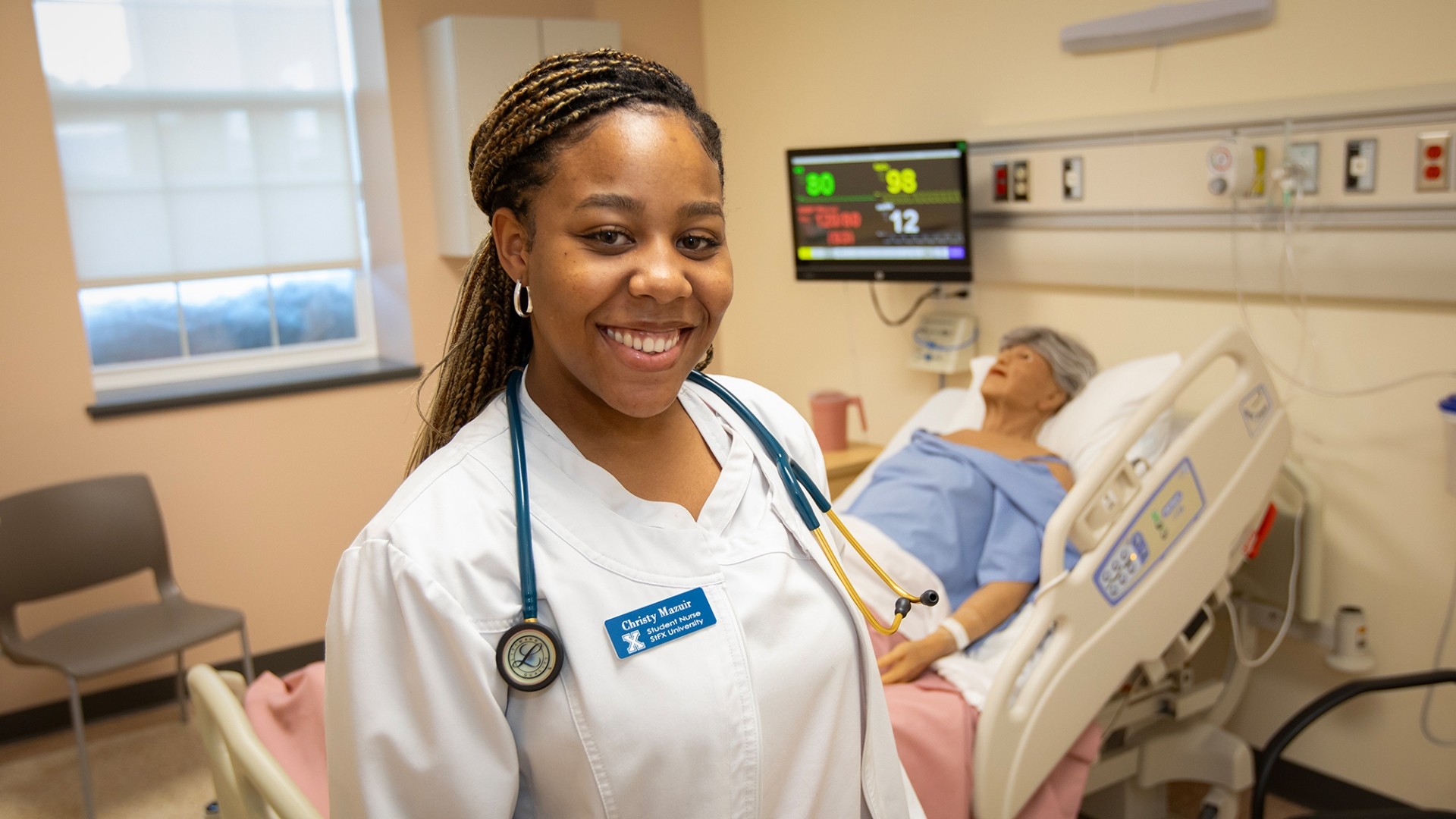
Editor’s Note: As we celebrate African Heritage Month in February, we’re proud to spotlight some of our own people, Black culture, contributions, and history. Here, we meet Christy Mazuir, who came to StFX from The Bahamas for the Accelerated Nursing program at StFX’s Rankin School of Nursing. Ms. Mazuir says she’s made lifelong friend in the program, is learning from talented, knowledgeable faculty—and she’s found her passion in nursing, particularly working with older populations.
A passion for nursing: Meet StFX student Christy Mazuir
Christy Mazuir says coming to StFX has helped her find her calling.
“I’ve realized nursing is my passion,” says Ms. Mazuir, a native of The Bahamas who will graduate this December from StFX’s Rankin School of Nursing’s Accelerated Nursing program.
“Meeting people here, I’ve made lifelong friends, that’s been my favorite part of the experience. And the teachers I’ve met love teaching and are very knowledgeable. It makes me love the field I’m going into even more.”
Interestingly, she took a circuitous route to both StFX and to nursing.
“It may be fate, the second time around,” says Ms. Mazuir, who was accepted into StFX after high school, but didn’t end up coming to Canada as it wasn’t financially feasible at the time.
Instead, she attended the University of Bahamas, graduating with a Bachelor of Science degree in biology with a minor in chemistry. After graduation she planned originally to attend medical school in the Caribbean. When the time came though, she wasn’t sure she was ready to put in the years of school required.
Her sister, a nurse, suggested she take a two year accelerated degree program to become a nurse and later continue her journey to become an MD.
Ms. Mazuir googled program options and StFX was among those that came up.
“It’s been working out ever since.”
Nursing appeals for several reasons, she says. More than just science, it’s also learning how to talk to people to make them feel comfortable, comfortable enough to share details about their health. It’s knowing not to be judgmental and learning to put yourself in someone else’s shoes and understand things from their perspective.
So many factors go into one’s health, “and nursing has taught us to be able to see what’s not necessarily visible…so you can help someone.”
Ms. Mazuir says it’s amazing to see how the human body works, and it is also sad to see how these mechanisms fail and how that can impact one’s life. “It’s satisfying to help an individual find a new normal.”
In particular, she says she’s found a passion for caring for older populations, who are often more vulnerable, sometimes overlooked, and, at times, mistreated.
She says her grandparents raised her and it gives her happiness to treat someone in a manner to how she would want her grandparents treated and cared for.
Ms. Mazuir says the accelerated nursing program is intense, but also manageable.
Along with her studies, she works two jobs, as a continuing care assistant at the R.K. MacDonald Nursing Home, and as a nail technician at the Antigonish Nail Boutique. Being busy helps her focus on the tasks at hand and not procrastinate.
The program has certainly inspired her. After her December graduation, Ms. Mazuir hopes to develop her skills further by working in the nursing field and is considering continuing her education, with an eye towards a master’s and PhD degree.
At StFX, she’s found the faculty are knowledgeable and passionate about their work.
Ms. Mazuir recalls a particularly impactful moment in Dr. Britney Benoit’s class. “It was the first time I truly felt seen. Dr. Benoit spoke in her class about racism in healthcare and the inequitable health outcomes experienced by black women during labour and the postpartum period.
“She also made an environment where it felt safe to talk about these inequities, and she made me feel completely comfortable in the classroom.”
Ms. Mazuir says, “for me, coming here, was the first time I truly realized I was black. Of course, I know I’m black,” she says, “but I’m from a predominantly black country, so I never felt out of place there.”
Coming to a predominantly white area, she said people tend to make you feel out of place, sometimes unintentionally by not knowing what to say or sometimes saying something offensive without realizing that it is offensive.
“They don’t understand what it is like to be different, to be a minority, or what it’s like to be without,” she says.
That’s one reason events such as African Heritage Month are important, to make the rich history, the struggles, and the achievements of black people visible, she says. It’s important to know and understand this history and how it shows up today, including in the health care system. It’s important too to see representation, especially for younger generations, to see role models and all the accomplishments and achievements of black people.

